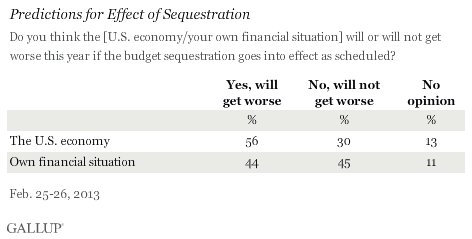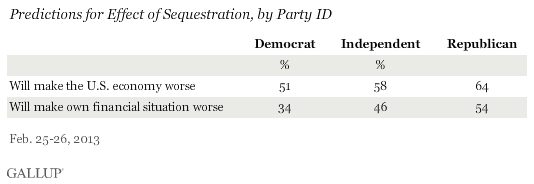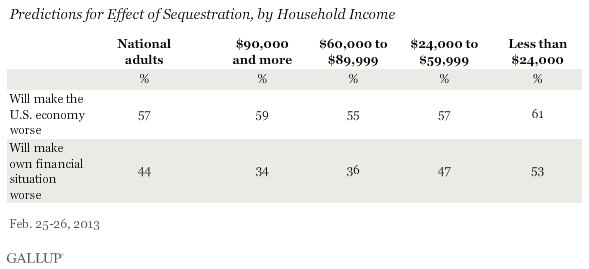PRINCETON, NJ -- A majority of Americans, 56%, believe the nation's economy will suffer this year if the federal budget sequestration scheduled for Friday goes into effect. At 44%, slightly fewer Americans believe sequestration will harm their own finances, while a nearly equal percentage say it will not.

The questions were asked of U.S. adults as part of Gallup Daily tracking on Feb. 25-26. Congress faces a March 1 deadline to stop a 10-year program of $1.2 trillion in government-wide spending cuts from taking effect. These spending reductions will entail approximately $85 billion in cuts in the 2013 fiscal year, about half of which are scheduled to come from defense and national security. To prevent sequestration, Republicans and Democrats in Congress would need to, in theory, agree on an alternate schedule of budget cuts -- which would not happen by Friday -- or, more practically, pass another temporary delay.
Republicans are more likely than Democrats to express concern about the potential effect of sequestration. Nearly two-thirds of Republicans, compared with half of Democrats, believe sequestration will make the economy worse, and the slight majority of Republicans versus a third of Democrats say it will make their own finances worse.

This runs somewhat counter to the broader finding that Republicans are slightly more likely than Democrats to say the sequester should be allowed to happen, 40% vs. 34%. Republicans are in fact divided over whether their member of Congress should let the budget sequestration go into effect as scheduled or vote for legislation to avert it (43% vs. 40%), whereas, by 47% to 34%, Democrats would rather avert it.
In other words, Republicans -- who are paying significantly closer attention to the news about sequestration than Democrats -- are less eager than Democrats to prevent sequestration. At the same time, they are more concerned than Democrats that sequestration will have negative consequences for the economy this year and themselves personally.
There could be many reasons for this divergence in Republicans' views. One possible explanation is that some Republicans may believe sequestration will cause short-term economic harm, but support it because they believe it will be beneficial in the long term. Alternatively, Republicans may be more inclined than Democrats to ascribe negative results to cuts the federal government makes when the president is a Democrat. A third possibility: Republicans may legitimately believe the sequestration cuts would be harmful, but perceive that triggering sequestration will either force more responsible cuts to be enacted or cause more political harm to President Barack Obama than to the Republicans.
Lowest Income Groups Expect to Feel Some Pain
Low-income Americans are likely to be the most affected by sequestration cuts to domestic programs, which is evident in the new Gallup data. Slightly more than half of adults in households earning less than $24,000 per year and 47% of those earning up to $60,000 per year say sequestration will make their own finances worse. By contrast, barely a third of those making $60,000 or more expect the cuts to harm them.
At the same time, there is no difference by household income in perceptions of how sequestration will affect the U.S. economy. Roughly six in 10 of all income groups say it will make the economy worse.

Bottom Line
Slightly more than half of Americans believe the federal budget cuts scheduled to take effect March 1 would be bad for the economy, while 44% think the cuts will harm their own finances. The latter figure may be the most relevant because it is similar to the 45% saying they want Congress to vote to avert sequestration. The rest are either in favor of letting sequestration happen (37%) or are unsure (19%).
Not surprisingly, low-income Americans are more likely than upper-income Americans to believe sequestration will negatively affect their own finances. Although Republicans have higher incomes on average than Democrats, Republicans are more likely than Democrats to say sequestration will hurt their wallets. Whether this is a straightforward reflection of how they feel or part of some intricate political calculus -- perhaps akin to the calculus driving political maneuvering over the sequester in Washington -- is unclear.
Survey Methods
Results are based on telephone interviews conducted as part of Gallup Daily tracking survey Feb. 25-26, 2013, with a random sample of 1,017 adults, aged 18 and older, living in all 50 U.S. states and the District of Columbia.
For results based on the total sample of national adults, one can say with 95% confidence that the margin of sampling error is ±4 percentage points.
Interviews are conducted with respondents on landline telephones and cellular phones, with interviews conducted in Spanish for respondents who are primarily Spanish-speaking. Each sample of national adults includes a minimum quota of 50% cellphone respondents and 50% landline respondents, with additional minimum quotas by region. Landline telephone numbers are chosen at random among listed telephone numbers. Cellphones numbers are selected using random digit dial methods. Landline respondents are chosen at random within each household on the basis of which member had the most recent birthday.
Samples are weighted to correct for unequal selection probability, nonresponse, and double coverage of landline and cell users in the two sampling frames. They are also weighted to match the national demographics of gender, age, race, Hispanic ethnicity, education, region, population density, and phone status (cellphone only/landline only/both, cellphone mostly, and having an unlisted landline number). Demographic weighting targets are based on the March 2012 Current Population Survey figures for the aged 18 and older U.S. population. Phone status targets are based on the July-December 2011 National Health Interview Survey. Population density targets are based on the 2010 census. All reported margins of sampling error include the computed design effects for weighting.
In addition to sampling error, question wording and practical difficulties in conducting surveys can introduce error or bias into the findings of public opinion polls.
View methodology, full question results, and trend data.
For more details on Gallup's polling methodology, visit www.gallup.com.
